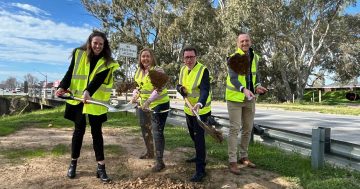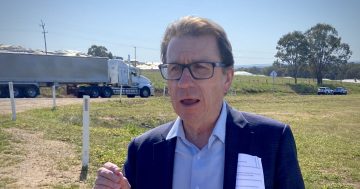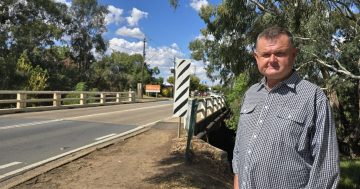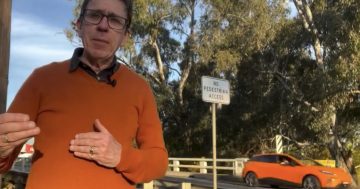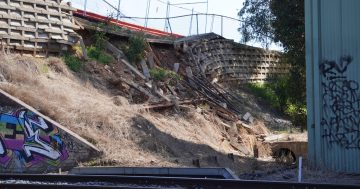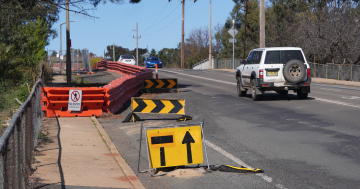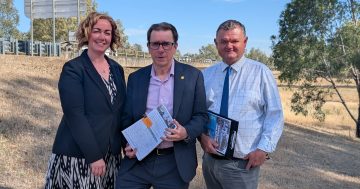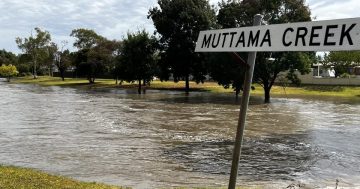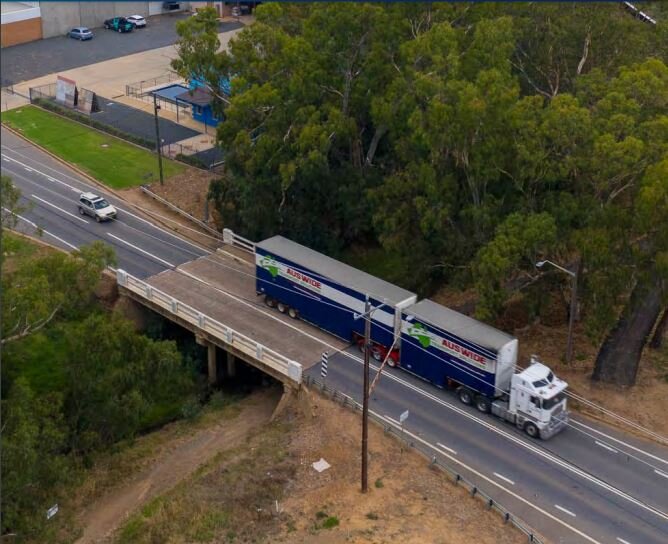
The choke point at Marshalls Creek Bridge. Photo: Transport for NSW.
“I wish somebody would build a bridge,” begins the chorus of Thirsty Merc’s 2004 hit and it’s a refrain that Wagga drivers have echoed as the NSW Government backs away from yet another vital infrastructure investment in our growing city.
This month, while confirming the plan for the controversial traffic lights on the Olympic Highway on either side of the Gobbagombalin Bridge, Transport for NSW quietly relegated the imminent upgrade of the Sturt Highway to four lanes across Marshalls Creek Bridge to a “long-term initiative”.
“We’re extremely disappointed that something that’s been planned so heavily over the past eight years, and even had a commencement date at one stage, is now being shifted to a long-term priority,” said Committee for Wagga chair Adam Drummond.
Wagga MP Dr Joe McGirr has pushed for transport upgrades, including the Marshalls Creek Bridge project, since being elected in 2018 and said the move was extremely disappointing.
“There was $30 million allocated for the work of the two intersections on the Gobba Bridge and the Marshalls Creek Bridge,” he explained.
“We’ve been pursuing the work on the Gobba Bridge for four years and we actually got Transport for NSW to go back to the community because the community weren’t happy with their designs.
“In the midst of all that, we’ve had COVID and all the cost escalations associated with that and clearly, the work on the Gobba Bridge has blown out.
“That’s understandable, but what is ridiculous is that they’re now prioritising the work on the Gobba Bridge ahead of Marshalls Creek.”
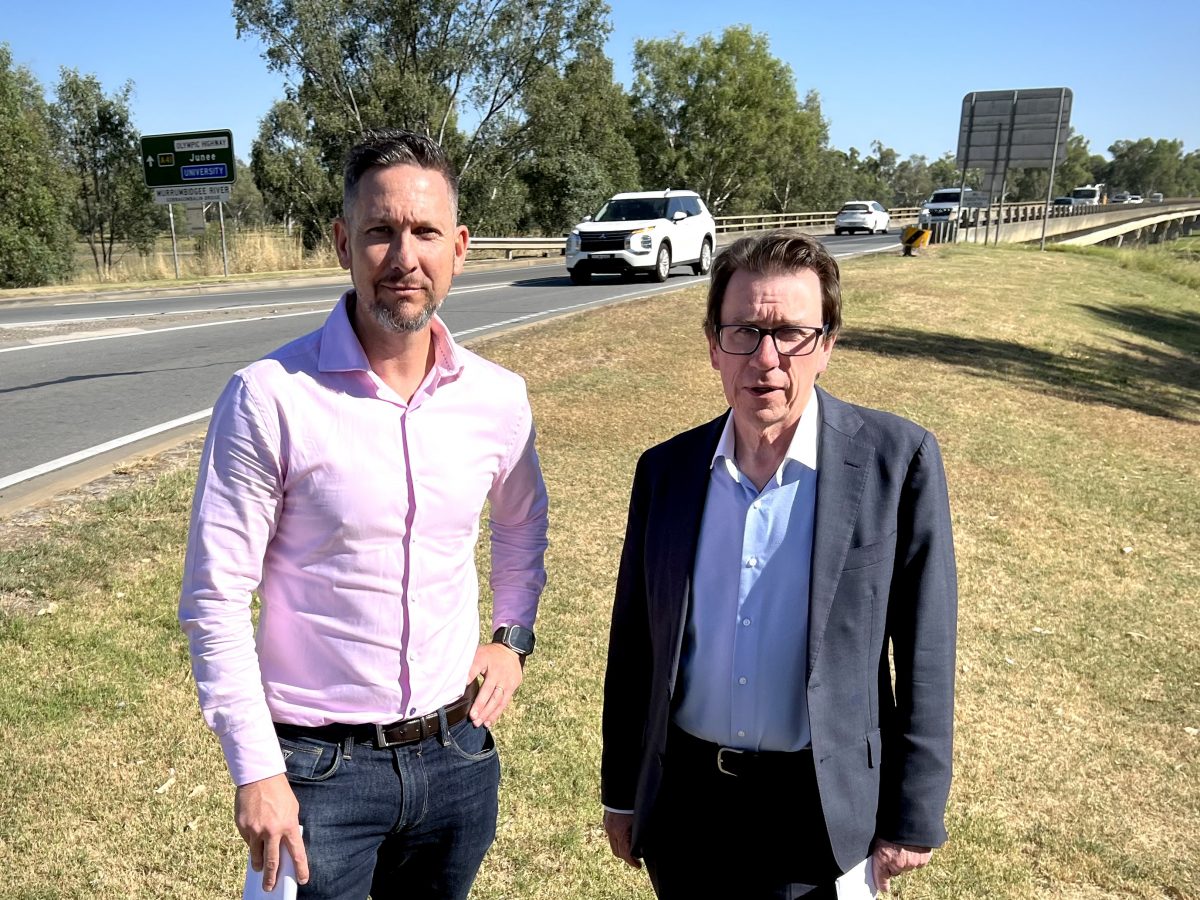
C4W chairman Adam Drummond (left) and MP Dr Joe McGirr at the southern entrance to Gobba Bridge. Photo: Chris Roe.
A Transport for NSW spokesperson confirmed that, due to the rising costs of construction, the $30 million allocated in the 2018 byelection was no longer enough to cover the cost of both projects.
“The Olympic Highway intersection upgrades were designed to improve safety and ease congestion while Transport continues to carry out investigations on Gobbagombalin Bridge and connectivity to the north of Wagga Wagga,” the spokesperson said.
“Prioritising this work resulted in the Marshalls Creek Bridge upgrade project becoming a longer-term initiative following a former state government decision at the beginning of this year.”
Earlier this month, Transport for NSW confirmed that it would proceed with a plan to install traffic lights at either end of the Gobbagombalin Bridge on the Olympic Highway despite heavy local opposition.
The decision to now abandon the Marshalls Creek project in favour of the controversial Olympic Highway upgrades has blindsided the community.
“If this was the sort of thing that happened in a business situation, you would probably be taking the person who had committed to the project to court,” Mr Drummond said.
In 2021, the former Minister for Regional Transport and Roads Paul Toole confirmed that the design for a $9.5m, four-lane bridge across Marshalls Creek was being drawn up and local Nationals MLC Wes Fang declared that the work was “expected to start later this year (2021) and take about 14 months to complete”.
While the work was again stalled, Transport for NSW released a video last year confirming that the planning was finalised and heralded a five-stage plan to “improve safety conditions” and fix a “major pinch point”.
“It was on the works plan for us, but then the weather damage meant that the potholes became the priority,” Mr Fang said, explaining why the work did not begin under the previous administration.
“It required that the same teams that were down to work on Marshalls Creek were redirected.”
Dr McGirr said he had already raised the matter with the Minister for Regional Transport and Roads Jenny Aitchison.
“I’ve made those representations to the Minister at two separate meetings and I actually believe that she’s receptive to that,” he said.
“She’s clearly getting advice herself but I’ve made it very clear what I believe the community wants.
“I think we have a perfect opportunity to get this right by doing the Marshalls Creek Bridge work first and then getting that study done on the Gobba Bridge.”
Mr Drummond said it was time for the State Government to reconsider its city-centric approach.
“We’ve been saying for a long time that we’re major contributors to the state’s economy and we should be treated as such.”







